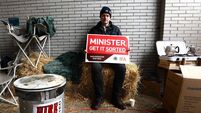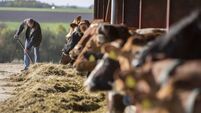Farm View: The Commission needs to be careful what it wishes for on nitrates
Farmers driving in convoy protesting changes to Ireland’s nitrates derogation at Cork Airport in 2024.
Brussels must tread carefully: ending the nitrates derogation could undo years of progress.
For the last two years in particular, Irish farmers have put their shoulders to the wheel, united behind one common goal: improving water quality.













